In the village of La Boca the next morning, I ate my cereal on the casa patio, in the nearby company of a large, caged parrot. He kept flapping his wings and looking at me, and I soon inferred he wanted to share my food. I discussed my upcoming plans with the with the casa owner, and with her approval, parrot happily pecked some small clumps of my granola. A glum taxi driver was invited to join us; he was hoping to take me in his vehicle some 50 miles to Cienfuegos, the next large city to the northwest, and via Trinidad – which I had already been to. But I had a negative impression of him, wanted to see more of the coastal area – and anyway his fee, more than twice what I paid for the lodging, seemed way out of line. I had a plan.
Returning to my room, I quickly packed my things into four bags; I wanted to start before the day heated up. I had found out that the road to the west ended at a small river near the town, so my plan to catch a ride in some vehicle needed to be revised. Loaded up with my heavy bags and saying adios to the casa owner, I sensed she thought I was crazy to be walking to the river instead of taking a taxi. 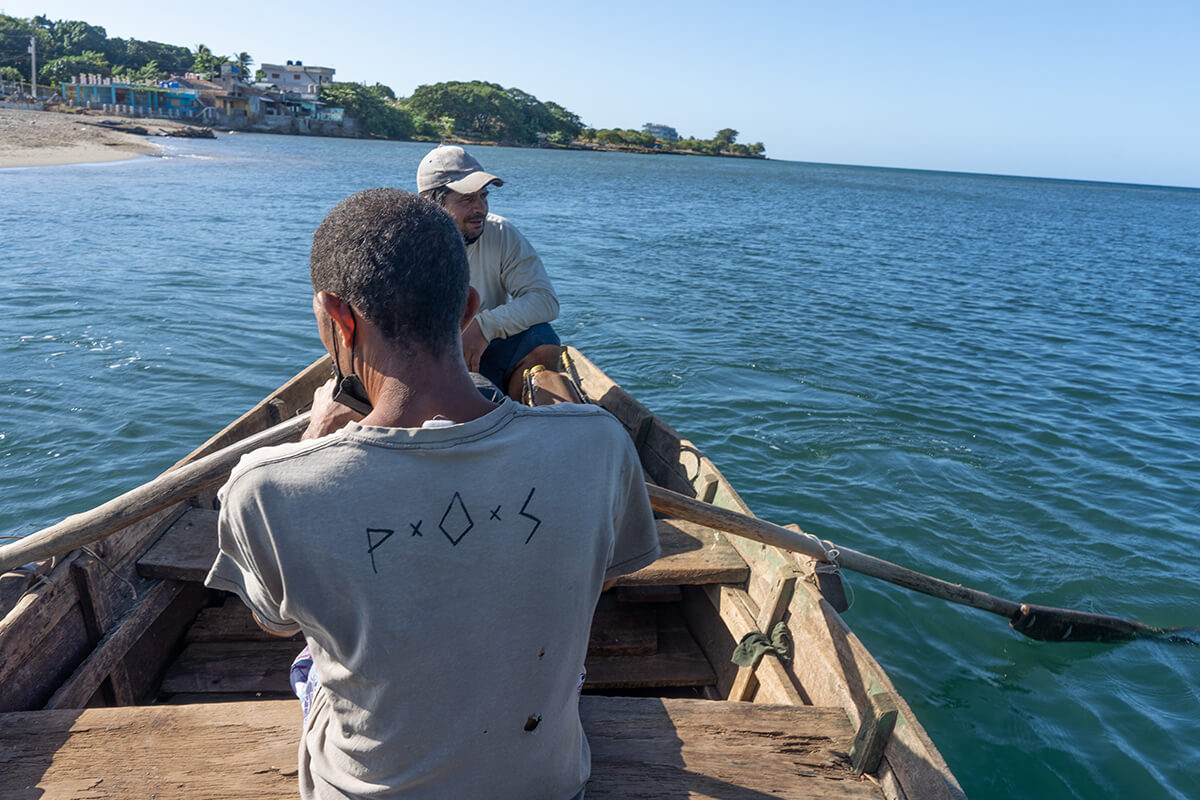 I walked about a half kilometer to the river crossing, hailed an approaching row boat, and came on board the precarious vessel, to be joined by another passenger. We were soon on the other side, and then began the most physically challenging portion of my Cuba trip thus far.
I walked about a half kilometer to the river crossing, hailed an approaching row boat, and came on board the precarious vessel, to be joined by another passenger. We were soon on the other side, and then began the most physically challenging portion of my Cuba trip thus far.
My bags weighed a total of some 80 lbs. I won’t go into details but there’s the camera bag with two systems and accessories; the small duffel bag with clothes, medicines, and food; my smallish backpack with tools, laptop, and critical items; and a handy, open bag with water, the small digital camera, inflatable lumbar support pillow, and some accessible food. Fully loaded up with everything, I began walking up a path to what I was told would be a road ahead. My leg muscles got a real workout as I had to ascend the riverbank. I trudged on slowly, relieved that at least the sun was at my back. 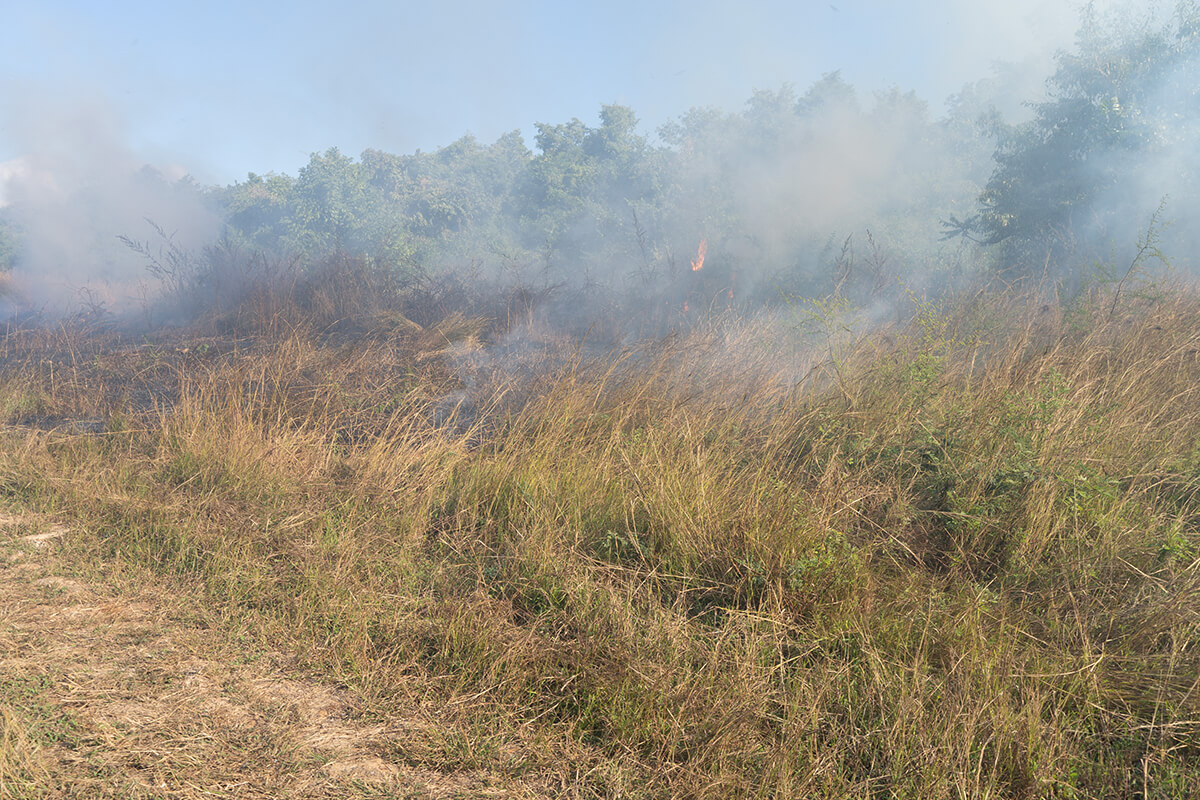 Further on the path, I noticed with concern a large brush fire and realized I would have to get around it. The grass crackled and hissed but the smoke was being blown away from me as I quickly moved past. I found that by putting the duffel bag strap on my forehead and keeping that bag on my shoulders, my discomfort was slightly less. At each turn in the path, I searched in vain for the main road. Robert Frost’s poem, “The Road Not Taken,” came to my mind, “…long I stood; And looked down one as far as I could; To where it bent in the undergrowth…”
Further on the path, I noticed with concern a large brush fire and realized I would have to get around it. The grass crackled and hissed but the smoke was being blown away from me as I quickly moved past. I found that by putting the duffel bag strap on my forehead and keeping that bag on my shoulders, my discomfort was slightly less. At each turn in the path, I searched in vain for the main road. Robert Frost’s poem, “The Road Not Taken,” came to my mind, “…long I stood; And looked down one as far as I could; To where it bent in the undergrowth…”
After walking about a kilometer and up some more rocky inclines, I was greatly relieved to hear a distant passing vehicle and knew the road was at hand. Once on the road, I walked further on past a bridge, and paused for a minute to take a photo of the stunning landscape rising before me.  I then installed myself under the shade of the sole tall tree and along the main road in the direction I needed to go. A light breeze cooled me as my now sweat-soaked clothes began to dry and I recalled the times I hitch-hiked in my youth. At age 19, I had done this in Ohio to get around and to where I attended university, and then a seminal and spiritual trip from Ohio to Texas when I was 20. When I was 25, heart broken by a young woman I loved, I quit my job at a public hospital and made an epic voyage of three months around seven Mediterranean countries, always hitch-hiking in Spain, Morocco, Algeria, and Tunisia. It was through these experience that I realized there was of no use in worrying about whether I would be picked up or by whom; it is all fate and in the Plan of the Universe.
I then installed myself under the shade of the sole tall tree and along the main road in the direction I needed to go. A light breeze cooled me as my now sweat-soaked clothes began to dry and I recalled the times I hitch-hiked in my youth. At age 19, I had done this in Ohio to get around and to where I attended university, and then a seminal and spiritual trip from Ohio to Texas when I was 20. When I was 25, heart broken by a young woman I loved, I quit my job at a public hospital and made an epic voyage of three months around seven Mediterranean countries, always hitch-hiking in Spain, Morocco, Algeria, and Tunisia. It was through these experience that I realized there was of no use in worrying about whether I would be picked up or by whom; it is all fate and in the Plan of the Universe.
Over the next hour, some four or five vehicles haughtily passed by my passively outstretched hand (I wasn’t sure if my thumb would be misinterpreted here, as in some other countries). I sighed, pondering if I would still be waiting at the end of the day. But when I heard a car and saw it coming toward me from the rise, I determined that this time I would make real eye contact and be more assertive. And, to my relief, the car did grind to a stop in short order!
I asked the driver if he might take me in the direction of Cienfuegos or to any of the intermediate villages, told him I would pay him something as well; that sealed the deal. His name was Roberto and he agreed to take me all the way to the city, which was a huge relief to me as I had already felt the full heat of the day. I had originally planned to stay the night in one of these villages, but knew it would present perhaps insurmountable challenges to impose myself where there was no proper lodging. And my muscles were rather burning from the recent hiking ordeal.
Roberto was a young man of perhaps 25, who, to my discomfort, began speeding as if we were in the Grand Prix auto race, around turns and past slower vehicles or animals in the road. Although I found a seat belt, I was increasingly alarmed, but said nothing. Instead, I began a light conversation to calm my nerves for the 100 kilometers ahead. Roberto revealed that he planned to migrate to the USA – and as soon as he could. He couldn’t wait to leave Cuba, a place where he felt economically insecure. I was fascinated to speak to someone at his juncture in migration. I accessed the audio recorder app on my mobile phone to document some of his mindset.
“A friend of mine just left Cuba and in four days had crossed the [Mexican] border – he’s now in the United States!” Roberto claimed. I found it somewhat dubious and pressed for details, but Roberto insisted it was true: the friend had first flown to Chile from Havana and entered illegally.
“What will your friend do in the United States if there is no work?” I asked while we slowed down to 50 mph to navigate around a group of escaped oxen.
“He’ll drive – be a [transportation] driver. There’s a lot of work to be had as drivers there.”
“I imagine it costs a lot to make such a trip,” I suggested, trying not to imagine Roberto driving in the USA.
“13 thousand dollars,” he retorted to my amazement. “But one can make a lot of money there.”
“But if you already have a business in Cienfuegos, you have a future. Why would you want to move to the USA?”
“Here the life is hard. Here if I own a taxi that’s mine today, tomorrow the [Cuban] government can just take it away.”
“Has that really happened?” I queried. His response was along the lines of a complaint of too much work and not enough income, and that the government takes a cut of any profits.
I inquired, “Are you married? Any kids?” He said he had a six-year-old daughter and his plan was to arrange to bring wife and daughter to the USA, “later,” after he had settled there
“Your daughter is going to really miss you,” I cautioned. “Pobrecita! It’s difficult for me to understand that you want to separate from your daughter and wife for a precarious future in the USA, where you’ll have to work so much harder…”
“Yes, work a lot more – but make a lot more money!”
“But is money so important?”
He sidestepped the moral aspect. “Ha! Here money is worthless,”.
“What do you think of the Cubans who immigrated decades ago?” I wanted to know.
“I think they are crazy. Because this [Cuban] government is never going to change for anyone. No one is going to remove this government!” He agreed with my comment, “They are dreamers”.
So he was going to the USA just “to make money.” But once he had “enough money,” he would return to Cuba. “Cuba is my fatherland,” he insisted.*
Roberto took me to the center of Cienfuegos and left. I didn’t see anywhere to lodge but didn’t want to look a gift horse in the mouth, as I again loaded myself up with my bags. 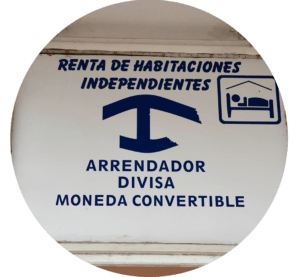 I sought out the peculiar blue anchor symbol denoting a casa particular for foreigners – or even any sign that said “Hostel,” as this was often suitable accommodations. Working up yet another soaking sweat from walking almost a kilometer and after knocking on a few doors and receiving rejections, however, I was tempted to look for a taxi to transport my aching body. I decided to turn down just one more street which dead ended at the waterside, and was rewarded with a positive response from a casa particular owner’s son.
I sought out the peculiar blue anchor symbol denoting a casa particular for foreigners – or even any sign that said “Hostel,” as this was often suitable accommodations. Working up yet another soaking sweat from walking almost a kilometer and after knocking on a few doors and receiving rejections, however, I was tempted to look for a taxi to transport my aching body. I decided to turn down just one more street which dead ended at the waterside, and was rewarded with a positive response from a casa particular owner’s son.
I ended up at a 2nd floor apartment and, having all the necessary amenities, a very clean and sanitary appearance, and, just across the entrance, a gorgeous view of the bay, which fronted the property, it seemed the best thus far on my Cuba trip. Dehydrated and wiped out, I celebrated with a much-needed can of lemon-flavored Cuban refresco serendipitously found in a well-stocked mini-fridge. After showering and resting a few minutes, I went out to explore the city and make some wi-fi connections at an ersatz pizzeria.
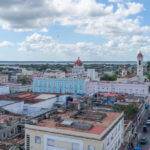
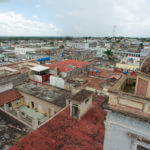
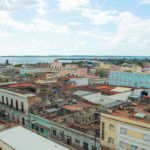
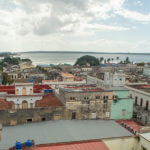
The pizza was virtually inedible (I ended up bringing all but my first bite to a street beggar), but I was pleased to find speedy internet service and be able to catch up on affairs on the home front. Cienfuegos is a compact and energetic city with many attractive features, albeit unkempt on many streets. There are poignant vestiges of a once-thriving tourism industry: shops, cafes, restaurants, museums. But the restaurants have little to offer and the shops are either virtually empty or with shelves holding multiples of just one or two items. The pizzeria was a large operation yet had no pepper or any beverages, save small bottles of water.
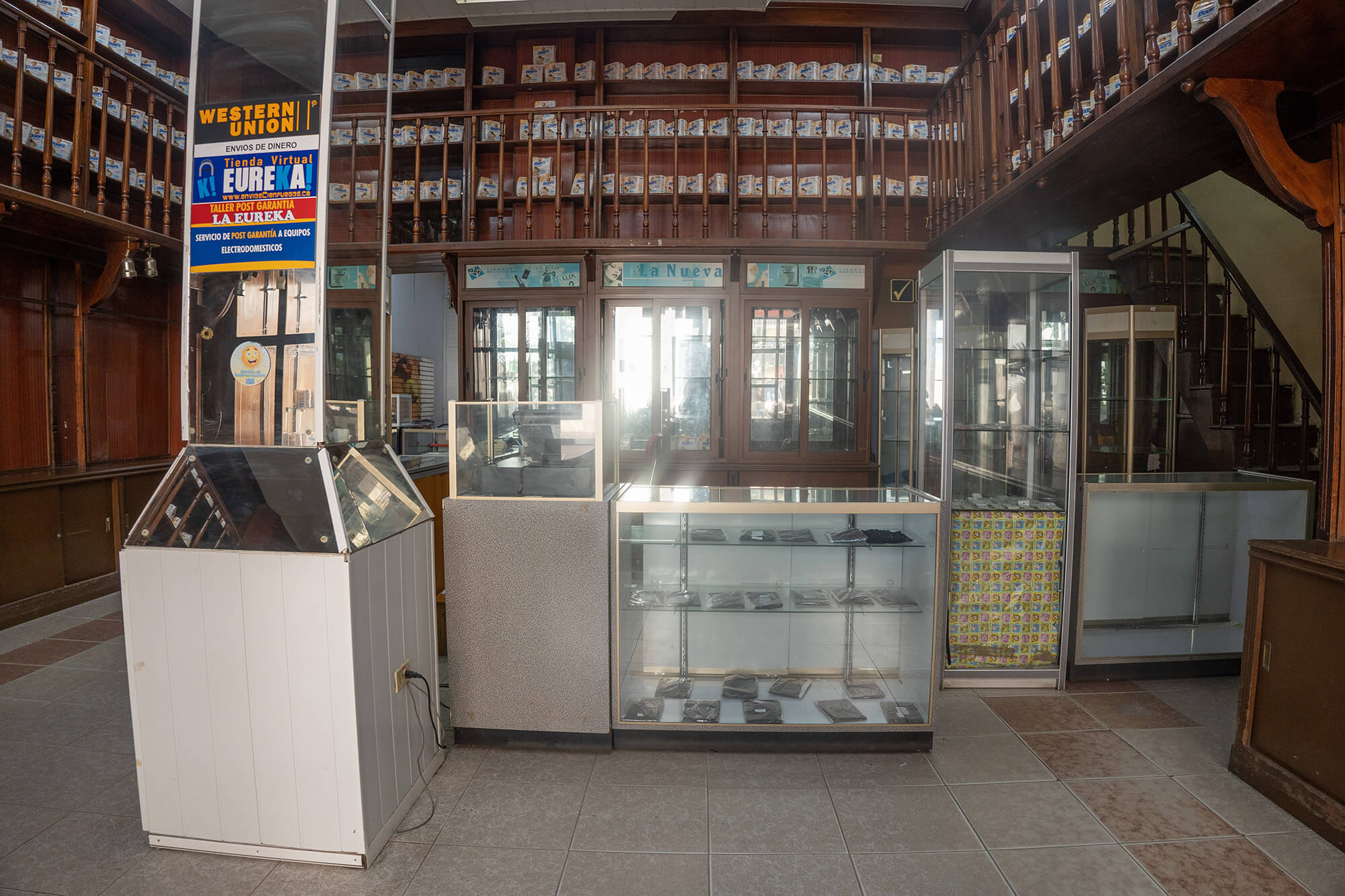
A shop in downtown Cienfuegos features hundreds of boxes of exactly the same product, as carefully designed as a fractal.
I came across the offices of the official Cuban Communist Party (PCC) and, with a mixture of moxie and naïveté, made an appointment to speak to the Political Director for the following day, hoping to get an official perspective of Cuba’s plans to extricate itself from the current economic crisis. Later, as I was walking back to my lodgings, I watched as a young horse-drawn cart driver run into the street and crack his whip on a passing horse, something he may have thought of as a prank. The horse bolted and whinnied. Incensed, yelled to the man, “That was cruel!” and his eyes betrayed shock that I would have the nerve to confront him. Smirking, he and an associate followed me a bit on their cart as some intimidation, but when I glared directly at them, they turned back. I played various scenarios in my mind about what I would do if a whip had come in my direction. Catch it? Deflect it with my laptop computer? Engage in jiu-jitsu?
That evening, after a dinner of trail mix, vegan jerky, and an entire cucumber, I lay in a very comfortable bed with real pillows and reflected on what the path I chose earlier that day had gotten me. I concluded that the physical trial was worth the effort, for I had learned a lot from Roberto and seen much more of the countryside. And that view over the bridge! I tried to rest but found it difficult, as my whole body was aching so much – especially my neck and shoulders. “You’re not getting any younger,” I reminded myself, as I swallowed a 500 mg Tylenol pill.
-
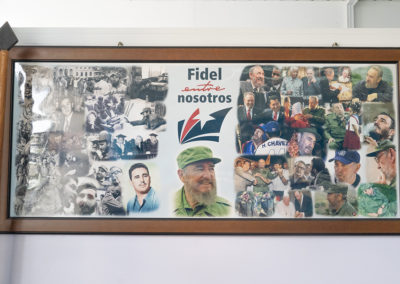
Framed retrospective of the life of Fidel is hung in a shop's most prominent place
-
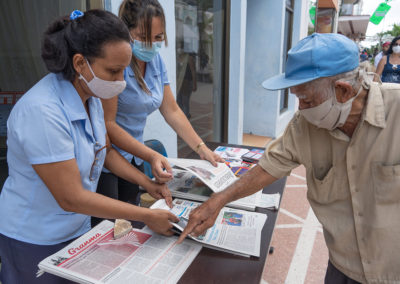
Newspapers for sale, including the official Cuban Communist Party organ, Granma, on the main boulevard of Cienfuegos.
-
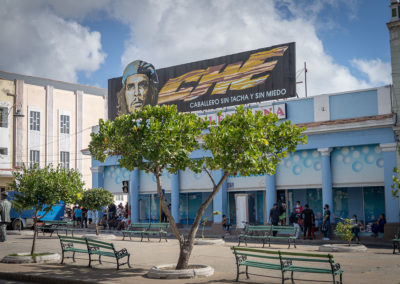
Che Guevara has become a veritible god for the Cuban communist adherents.
-
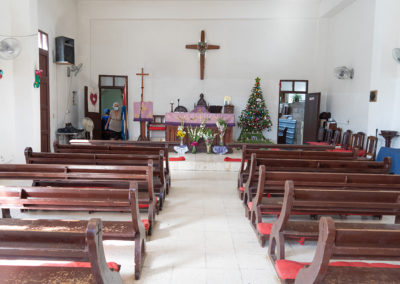
One of the rare churches in Cienfuegos. It is decked out for the impending Christmas celebration. The pastor confided in me that the state "did not provide much support," but was tolerant of religions.
-
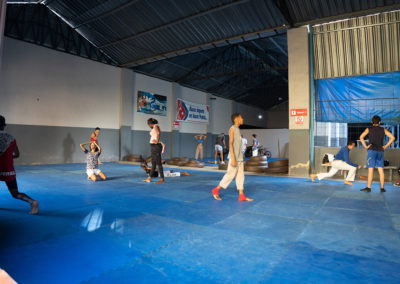
A workout gym in Cienfuegos.
-
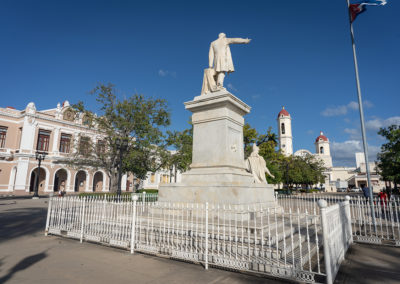
Cuba's highly esteemed historical hero, José Martí, looks out on to central Cienfuegos.
-
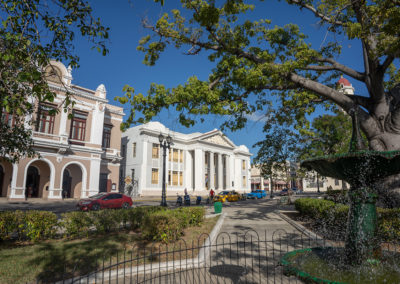
The Plaza Central featues buildings wielding classical façades.
For a detailed description of another route, via Nicaraguan entry, read this essay.
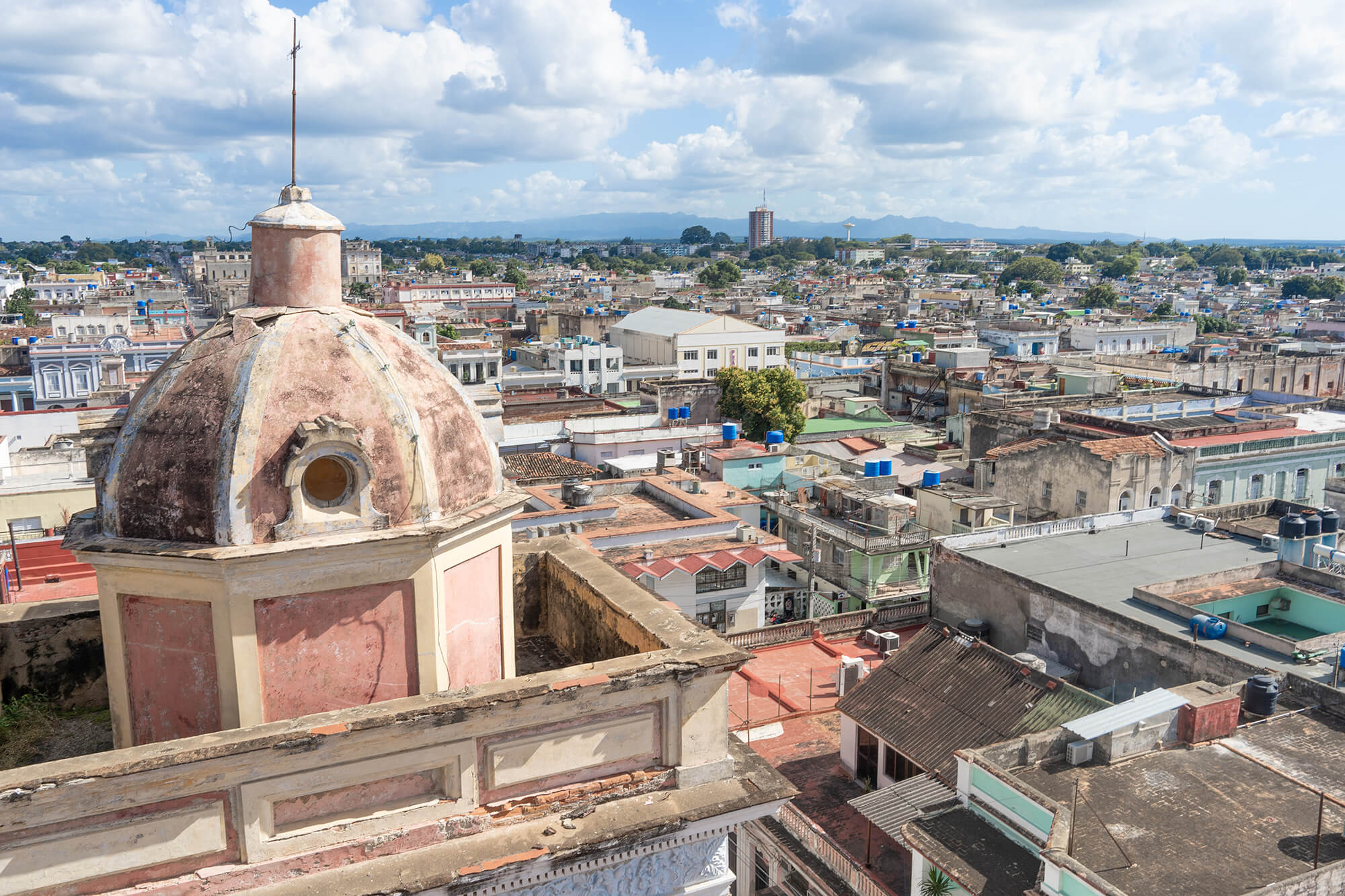
0 Comments